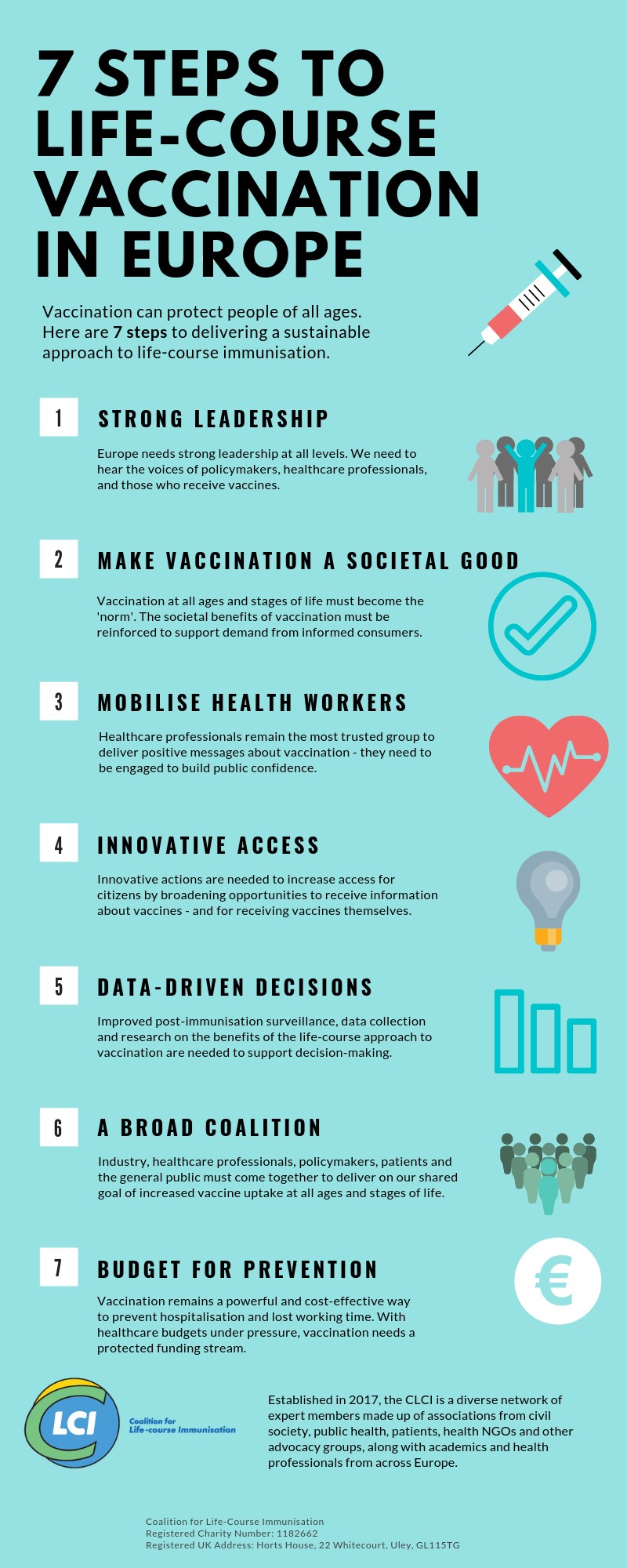Today’s health systems face a complex set of challenges, including climate change, population mobility, geopolitical tensions and an ageing population.
Prioritising prevention is vital to protect individuals and ease pressure on health services, yet we also see persistent vaccine access and uptake inequities.

That is why the Coalition for Life-course Immunisation (CLCI), a European advocacy charity striving to make vaccinations accessible throughout life, is driving data-informed vaccine decision-making.
CLCI has teamed up with Tomislav Sokol, a Member of the European Parliament, and The European Institute for Innovation through Health Data to explore ways of improving the use of data in national immunisation programme (NIP) planning. Read the report here.
Support NITAGs to use multi-dimensional data that tells the right story
National Immunisation Technical Advisory Groups (NITAGs) play a pivotal role in vaccination recommendations, which form the cornerstone of NIPs.
Most NITAGs have transitioned from relying primarily on expert opinion and clinical experience to inform their decisions to adopt the Grading of Recommendations, Assessment, Development and Evaluation (GRADE) approach. This evidence-based approach to NIP planning has bridged knowledge gaps, but has also unveiled some limitations, such as translating Randomised Controlled Trials (RCTs) findings to real-world scenarios.
Using robust data collected from different study methodologies, such as real-world studies and conceptual models, as well as RCTs, can address knowledge gaps and provide a more accurate picture of what is happening in the real world. NITAGs urgently need training and investment to do this.
Standardise and harmonise data sets to integrate them into decision-making
The inception of the European Health Data Space (EHDS) on 3 May 2022 was a significant stride towards harmonising data across member states. This initiative is a linchpin for evidence-based disease prevention and control strategies across Europe, setting a solid legal framework for harmonising health data for research, innovation, and policymaking while maintaining data security and privacy.
Utilise modern technologies to expand systematic testing and surveillance.
AI holds a great opportunity to integrate and analyse larger, more complex data sets from a range of sources to inform life-course immunisation policies. However, its potential to enhance health outcomes and patient experiences depends on overcoming technical, legal, and implementation challenges, such as understanding the local context, cultural relevance, and transferability of AI models across different healthcare systems.
Further open communication channels to share data and build public trust
More open communication between countries and stakeholders, including industry, can contribute to a deeper understanding of vaccine effectiveness, safety profiles, and real-world outcomes. The public is a critical group to communicate effectively with, as lack of clarity can fuel distrust and reduce uptake.
For example, during the COVID-19 pandemic, the media coverage focused on the COVID-19 vaccine reducing transmission, which is almost impossible for respiratory virus vaccines. These can only “control” respiratory tract infection, i.e. minimise morbidity and mortality. Public distrust in vaccine effectiveness grew when the vaccine campaign did not reduce incidence rates as the public expected.
Whilst AI and other technology advancements hold great opportunities in healthcare and public health planning, they also carry significant risks, some of which the sector can overcome through multidisciplinary stakeholder collaboration, transparency, open dialogue and clear accountability.
A data-driven future
There is a clear need to standardise and harmonise diverse data sets through platforms like the EHDS, enhance surveillance systems, and promote open communication between governments, NITAGs, industry, and the public.
Let’s work together for a future where a systematic, data-driven approach to vaccination recommendations protects individual and community health, fostering healthier lives and stronger communities.
Read the report in full here. Sandra Evans is the director of Sandra Evans Health Policy and leads the research and communications for CLCI.




